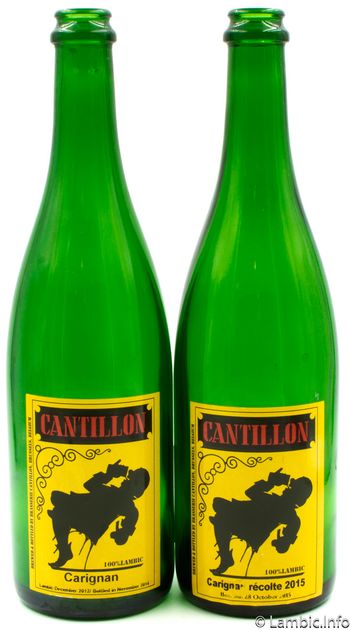Cantillon Carignan: Difference between revisions
| Line 19: | Line 19: | ||
! Image Link | ! Image Link | ||
|- | |- | ||
| 11/2014|| | | 11/2014|| 750 mL||Batch 1, Yellow label reads "Lambic December 2012 / Bottled in November 2014" || | ||
|- | |- | ||
| 10/28/2015|| | | 10/28/2015|| 750 mL||Batch 2, Yellow label, grapes from Austria||[[File:Carignan Recolte 2015.jpg|50px|frameless]] | ||
|- | |- | ||
| 10/14/2016|| | | 10/14/2016|| 750 mL||Batch 3||[[File:20170620 110339.jpg|50px|frameless]] | ||
|- | |- | ||
| 10/18/2017|| | | 10/18/2017||750 mL||Batch 4, yellow label|| | ||
|- | |- | ||
|} | |} | ||
Revision as of 20:00, 17 January 2025

Description
Cantillon Carignan is a lambic with Carignan grapes added. It is bottled in 750 mL bottles.
History / Other Notes
In September 2014 Cantillon posted a picture of Carignan fermenting in a barrel making it the first public posting about this beer. The brewery noted that the Carignan grapes came from Lionel Maurel from Mas d'Agalis in the south of France who works exclusively with organic grapes. 200kg of Carignan grapes were placed in a 400 liter barrel with lambic from the 2012-2013 brewing season. Carignan was first served at the brewery in the days preceding the 2015 public brewing session. A second batch was bottled in October, 2015.
The Carignan grape itself is likely of Spanish origin before being transplanted throughout other parts of Europe. It is a high yielding vine in the Languedoc-Roussillon region. Due to its high acidity and tannins, it is often used as a blending component and rarely bottled as a varietal.
Bottle Log

